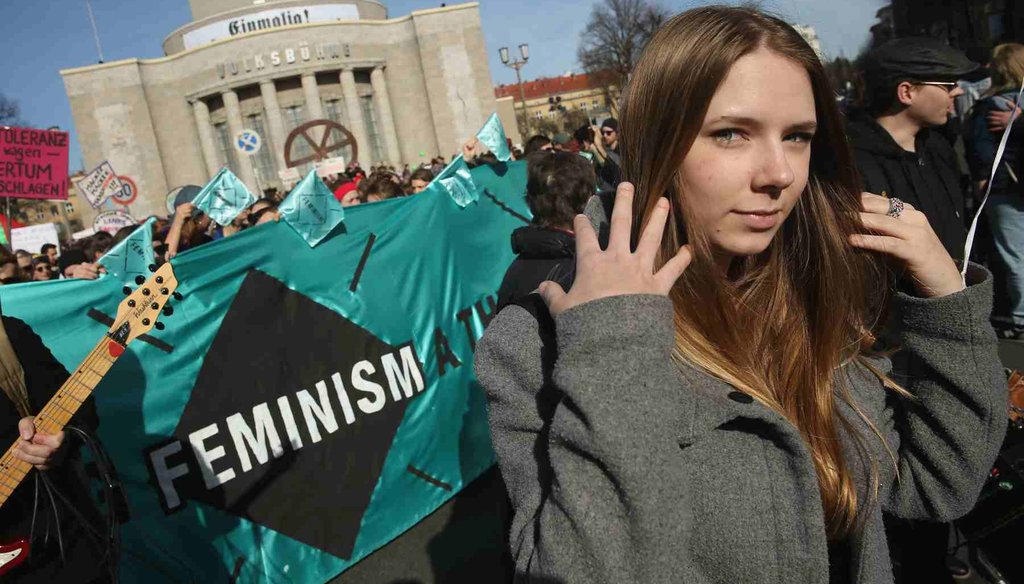Stand up for the facts!
Our only agenda is to publish the truth so you can be an informed participant in democracy.
We need your help.
I would like to contribute

Marchers in Berlin, Germany, celebrate International Women's Day on March 8, 2015. (Getty)
An informal network of nonpartisan fact-checkers have collaborated again in recent months for a "factcheckathon," this time fact-checking claims about women for International Women’s Day. Different fact-checkers looked at claims about women’s health, wealth and other topics. Below are brief summaries of the various organization’s fact-checks; see the group’s collected work here.
PolitiFact’s PunditFact project fact-checked a graphic from that said, "ISIS LURES WOMEN WITH KITTENS, NUTELLA." ISIS supporters create and promote propaganda messages that are more slickly produced and reach wider audiences than efforts from other terrorist groups. But to say they use kittens and nutella to target women is incomplete and misleading. ISIS uses many tactics to persuade people to give up their lives for their fight, experts said. The real motivations for someone joining the fight run much deeper and are connected to the pursuit of identity and purpose. To boil down ISIS’ recruitment strategy of women to nutella and kittens is a vast oversimplification. We rated the claim Mostly False.
AfricaCheck looked at maternal death rates in Zimbabwe, dissecting specific claims about the number of women who have died in childbirth. AfricaCheck found that available estimates vary because of the difficulty in determining whether women died due to complications from childbirth. Researchers conduct surveys where they ask people if any of their sisters have died and of what causes. That presents challenges, because people may not recall a cause of death or give a false cause due to social stigma of transmissible diseases, such as AIDS. AfricaCheck found that claims that maternal death rates were as high as 960 per 100,000 were exaggerated.
Factcheck EU examined a claim about women in positions of political power made by Federica Mogherini, who holds a position coordinating the European Union’s foreign affairs and security policy. "Today women represent less than 20 percent of members of national parliaments, and even less among government ministers," she said. "Overall in the EU women occupy less than a third of political decision-making positions." Factcheck EU ran the numbers and found them somewhat less bleak. For example, women constitute about 37 percent of all members of the European Parliament. Their assessment of her accuracy: Almost.
The Washington Post Fact Checker dug into a statement from Oxfam on women’s work and wealth: "Women perform 66 percent of the work, produce 50 percent of the food, but earn only 10 percent of the income and own 1 percent of the property." The Fact Checker found that the statistic was at least 40 years old, and it may not have been accurate even then, as it was a poorly sourced figure. The claim earned the fact-checker’s worst rating: Four Pinocchios. (Last year, PolitiFact looked at the claim that women own 1 percent of property and rated the claim Pants on Fire, for similar sourcing problems.)
Sign up for PolitiFact texts
Turkey’s Dogruluk Payi ("accuracy share") looked into a claim from Minister of Interior Efkan Ala that the rate of women’s participation in labor force has increased to 45 percent, up from 10 percent a decade ago. The fact-checkers found it had not increased that much, hitting only 31.1 percent in 2014. Also, the lower number wasn’t as bad: Ten years ago, the women’s participation rate was 23.3 percent. Dogruluk Payi concluded the statement was false.
Argentina’s Chequeado examined a claim from new health minister Daniel Gollán, who said that illegal abortions are contributing to the maternal mortality rate in Argentina. Chequeado found that abortions conducted in insecure conditions are in fact the first cause of maternal death, representing about 20 percent of the 245 deaths related to pregnancy in 2013. Argentina imposes significant restrictions on abortion, allowing it only in the case of rape of if the mother’s life is in danger. Argentina has committed to cutting its maternal mortality rate but is lagging behind its stated goal. Chequeado found that Gollán’s statement is true.
Chile’s El Polígrafo looked at a claim from President Michelle Bachelet, who said that one-third of women in the world "suffer some kind of physical or sexual violence." El Poligrafo, a project of the newspaper El Mercurio, found that the statement was based on a 2013 World Health Organization study, but the study was founded on databases from two territories of 79 countries, instead of national samples. Overall, El Polígrafo found the statement half true.
Italy’s Pagella Politica fact-checked a claim about murder rates from Laura Boldrini, president of the Italian Chamber of Deputies. Boldrini said that in 20 years, the homicide rate for men has fallen by 75 percent, while it has not changed for women. In Italy, the homicide rate for men is 1.1 per 100,000 men compared with 0.58 per 100,000 women. Homicide rates for men have fallen significantly since the 1990s, when it was at or above 4 per 100,000, while it has remained essentially unchanged for women. The statement is true.
Uruguay’s UYCheck investigated a statement that there are more women in Uruguay’s cabinet than at any time in history; the speaker was Monica Xavier, who serves in the Senate of Uruguay. The fact-checkers found that five women have been named as ministers, the previous record was three. UYCheck found the statement True.
Brazil’s Preto no Branco looked into the claim that the Brazilian government was opening a "House of the Brazilian Women" in 27 state capitals. The houses provides support, assistance and protection to women that are victims of violence. Preto no Branco described the statement as "too early to tell."
Our Sources
See links for sources.

















































